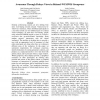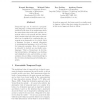252 search results - page 41 / 51 » Why Do Upgrades Fail and What Can We Do about It |
CCS
2000
ACM
13 years 11 months ago
2000
ACM
The Internet provides an environment where two parties, who are virtually strangers to each other, can make connections and do business together. Before any actual business starts...
GRAPHICSINTERFACE
1996
13 years 9 months ago
1996
Desktop conferencing systems are now shifting from strict view-sharing towards relaxed "what-you-see-iswhat-I-see" interfaces, where distributed participants in a real t...
ATAL
2011
Springer
12 years 7 months ago
2011
Springer
Proper scoring rules, particularly when used as the basis for a prediction market, are powerful tools for eliciting and aggregating beliefs about events such as the likely outcome...
KR
1991
Springer
13 years 11 months ago
1991
Springer
Temporal logic can be used as a programming language. If temporal formulae are represented in the form of an implication where the antecedent refers to the past, and the consequen...
AFP
2004
Springer
14 years 1 months ago
2004
Springer
Abstraction and application, tupling and projection: these provide the ‘software engineering’ superstructure for programs, and our familiar type systems ensure that these opera...


